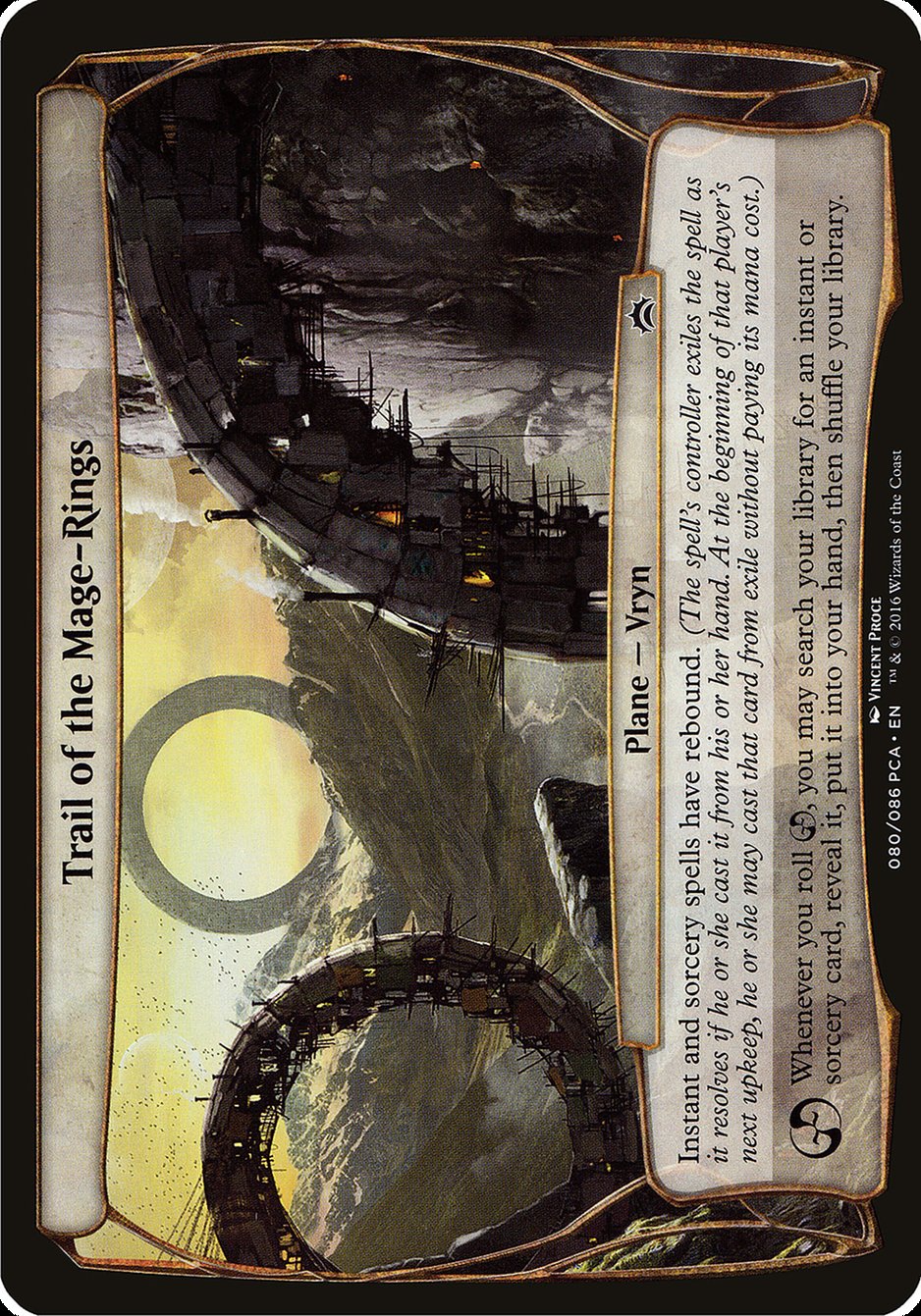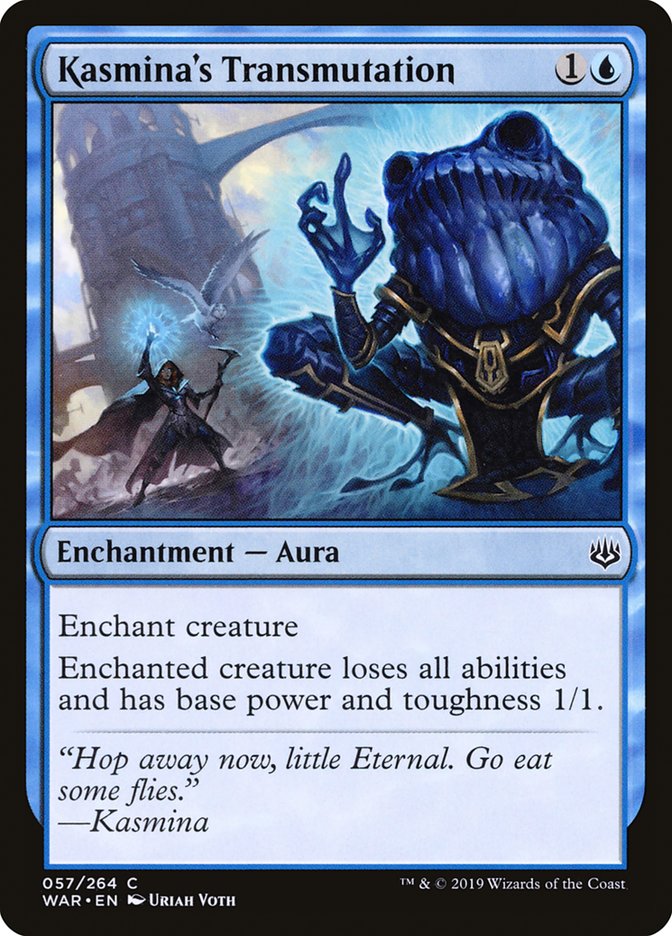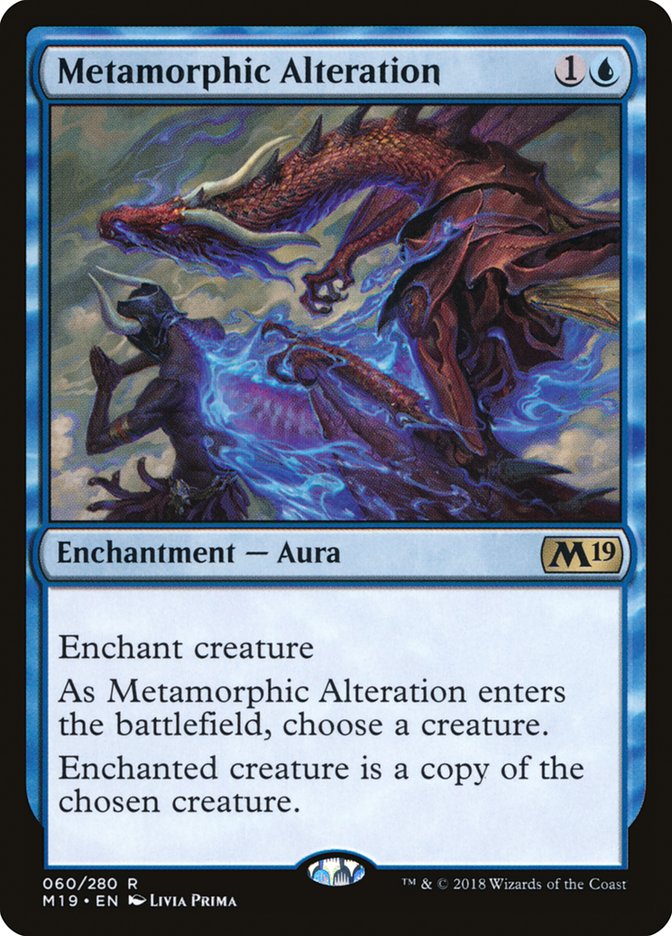Trail of the Mage-Rings Carta MTG
| Rareza | Común |
| Tipo | Plane — Vryn |
| Liberado | 2018-12-25 |
| Coleccione símbolo | |
| Coleccione nombre | Planechase Anthology Planes |
| Coleccione código | OPCA |
| Número | 80 |
| Frame | 2015 |
| Disposición | Planar |
| Border | Negra |
| Ilustrado por | Vincent Proce |
Texto de la carta
Los hechizos instantáneos y de conjuro tienen reencarnación. (El controlador del hechizo exilia el hechizo al resolverse si lo lanzó desde su mano. Al comienzo del próximo mantenimiento de ese jugador, puede lanzar esa carta desde el exilio sin pagar su coste de maná.) Cada vez que tires {Caos}, puedes buscar en tu biblioteca una carta de instantáneo o de conjuro, revelarla, ponerla en tu mano, y luego barajar tu biblioteca.
Cartas Similares
Trail of the Mage-Rings se destaca en el mundo de Magic: The Gathering como un encantamiento que aporta un giro único al juego. Encantamientos similares, como la Transmutación de Kasmina, también cambian la dinámica de las criaturas en el campo de batalla. Sin embargo, la Transmutación de Kasmina transforma permanentemente a una criatura, reduciendo su capacidad de impactar en el juego, mientras que Trail of the Mage-Rings tiene el potencial de modificar el juego turno tras turno.
De manera comparable, la Alteración Metamórfica es otro encantamiento que comparte algunas características con Trail of the Mage-Rings, ya que también puede alterar las habilidades de las criaturas. Pero a diferencia de Trail of the Mage-Rings, que afecta a varias criaturas, la Alteración Metamórfica se dirige a una sola criatura y la convierte en una copia de otra criatura. Esto proporciona un contraste marcado en términos de influencia general durante una partida.
Cuando se trata de infundir al juego un efecto persistente, Trail of the Mage-Rings ofrece un alcance más amplio de influencia, afectando a múltiples criaturas y mejorando la estrategia del jugador en cada turno. Esto lo convierte en una opción considerable para los jugadores que buscan potenciar el rendimiento de las criaturas en general.
Pros de la carta
Ventaja de carta: Trail of the Mage-Rings ofrece el beneficio estratégico de filtrar la porción superior de tu biblioteca. Al elegir selectivamente tus robos, aumentas la probabilidad de acceder a elementos clave dentro de tu mazo, mejorando la calidad general de tus cartas durante el juego.
Aceleración de recursos: Esta carta te permite enderezar múltiples tierras, potencialmente aumentando rápidamente tu mana disponible en un solo turno. Este impulso puede ser decisivo, especialmente al prepararte para hechizos de alto coste o cuando necesitas responder rápidamente con jugadas impactantes.
Velocidad instantánea: La flexibilidad de lanzar Trail of the Mage-Rings a velocidad instantánea no puede ser pasada por alto. Esta versatilidad te permite adaptarte a estados de tablero en evolución de forma fluida, responder prontamente a las acciones de los oponentes y potencialmente obtener ventajas estratégicas significativas, todo sobre la marcha.
Contras de la carta
Requisito de descarte: Si bien activar el poder de Trail of the Mage-Rings promete una magia poderosa, viene con el alto precio de descartar una carta. Este requisito puede plantear un inconveniente significativo durante el juego, especialmente cuando tu mano ya está agotada, obligándote a elegir entre mantener recursos preciados o habilitar un efecto potencialmente beneficioso.
Coste específico de maná: Con el poder de Trail of the Mage-Rings no viene sin sus restricciones, ya que exige una combinación particular de tipos de maná para ser lanzada. Esta especificidad reduce el alcance de mazos que pueden acomodar fácilmente la carta, excluyéndola potencialmente de estrategias de base de maná diversa donde su alineación no sea perfecta.
Coste de maná comparativamente alto: La magia contenida en Trail of the Mage-Rings no es barata, poseyendo un coste de maná que es considerable al compararlo con otras opciones en la misma categoría. Jugadores astutos podrían descubrir que invertir en el coste por el efecto proporcionado por esta carta no siempre se alinea con una estrategia eficiente, ya que otras cartas de hechizo podrían ofrecer beneficios similares a un ritmo más económico.
Razones para incluir Trail of the Mage-Rings en tu colección
Versatilidad: Trail of the Mage-Rings es una carta que puede integrarse en una variedad de construcciones de mazos con facilidad. Su capacidad para filtrar y manipular la parte superior de tu mazo garantiza que tengas las herramientas adecuadas en el momento adecuado, sin importar la estrategia que estés siguiendo.
Potencial de combo: Esta carta brilla en mazos diseñados en torno a lanzar una avalancha de hechizos. Tiene el potencial de trabajar en conjunto con otras cartas para lograr efectos poderosos cada turno, ayudando a impulsar tu victoria a través de ventajas incrementales.
Relevancia en el meta: Con una escena competitiva en constante evolución, Trail of the Mage-Rings se mantiene relevante al adaptarse bien a los cambios en el entorno de juego. Su capacidad de filtrado de mazo puede ser crucial para superar a los oponentes y mantenerse un paso adelante en el meta.
Cómo vencer
Trail of the Mage-Rings presenta un desafío único al ofrecer ventajas incrementales a su controlador. Esta carta destaca en mazos construidos en torno a lanzar hechizos, fortaleciendo constantemente el poder de cada hechizo lanzado. Sin embargo, al igual que todas las cartas de MTG, hay formas estratégicas de mitigar su impacto en el juego. Un enfoque es priorizar la eliminación de encantamientos, utilizando cartas como Desencantar que pueden apuntar directamente a Trail of the Mage-Rings. Denegarle a tu oponente esta fuente de valor repetible es crucial.
Además, centrarse en estrategias agresivas puede superar los beneficios proporcionados por Trail of the Mage-Rings. Los mazos que pueden aplicar presión temprana y reducir el total de vida del oponente antes de que puedan aprovechar completamente el poder de la carta tienen una ventaja distinta. Además, los mazos que limitan el número de hechizos lanzados o utilizan contramagia también pueden amortiguar efectivamente el impacto de esta carta, al prevenir la acumulación de su potencia a lo largo de una partida.
La conciencia del meta y la preparación con cartas de banquillo diseñadas específicamente para manejar encantamientos pueden cambiar la marea a tu favor. En esencia, la remoción rápida, la agresión estratégica y la interrupción son clave para superar el desafío planteado por Trail of the Mage-Rings en un entorno de MTG.
Donde comprar
Si estás buscando comprar una carta MTG Trail of the Mage-Rings de un coleccione específico como Planechase Anthology Planes, existen varias opciones confiables que debes considerar. Una de las fuentes principales es tu tienda de juegos local, donde a menudo puedes encontrar paquetes de refuerzo, cartas individuales y mazos preconstruidos de colecciones actuales y pasadas. A menudo ofrecen el beneficio adicional de una comunidad donde puedes intercambiar con otros jugadores.
Para un inventario más amplio, particularmente de colecciones más antiguos, mercados en línea como TCGPlayer, Card Kingdom y Card Market ofrecen amplias selecciones y te permiten buscar cartas de colecciones específicos. Las plataformas de comercio electrónico más grandes como eBay y Amazon también tienen listados de varios vendedores, lo que puede ser un buen lugar para buscar productos sellados y hallazgos raros.
Además, el sitio oficial de Magic suele tener un localizador de tiendas y listas de minoristas para encontrar Wizards of the Productos con licencia costera. Recuerde comprobar la autenticidad y el estado de las cartas al comprarlas, especialmente a vendedores individuales en mercados más grandes.
A continuación se muestra una lista de algunos sitios web de tiendas donde puede comprar las Trail of the Mage-Rings y otras cartas MTG:
 COMPRAR
COMPRAR BurnMana es un socio oficial de TCGPlayer
- eBay
- Card Kingdom
- Card Market
- Star City Games
- CoolStuffInc
- MTG Mint Card
- Hareruya
- Troll and Toad
- ABU Games
- Card Hoarder Magic Online
- MTGO Traders Magic Online
Ver productos MTG
Reglas e información
La guía de referencia para las reglas de las cartas Trail of the Mage-Rings de Magic: The Gathering proporciona las reglas oficiales, las erratas emitidas, así como un registro de todas las modificaciones funcionales que se han producido.
| Fecha | Texto |
|---|---|
| 01/06/2012 | La habilidad desencadenada retrasada de Rebound te permitirá lanzar el hechizo al comienzo de tu próximo mantenimiento incluso si en ese momento el juego ha abandonado el Rastro de los Anillos del Mago. |
| 15/04/2013 | Al comienzo de tu mantenimiento, todos los efectos desencadenados por rebotar con retraso se activan. Puedes manejarlos en cualquier orden. Si deseas lanzar una carta de esta manera, lo haces como parte de la resolución de su efecto desencadenado retardado. Las restricciones de tiempo basadas en el tipo de carta (si es un conjuro) se ignoran. Otras restricciones no lo son (como la de la Regla de la Ley). |
| 15/04/2013 | Si un efecto de reemplazo hiciera que un hechizo con recarga que lanzas desde tu mano vaya a otro lugar en lugar de tu cementerio (como podría ser Leyline of the Void), elige si aplicar el efecto de recarga o el otro efecto al resolverse el hechizo. |
| 15/04/2013 | Si un hechizo tiene restricciones sobre cuándo se puede lanzar (por ejemplo, "Lanzar -ste hechizo] solo durante el paso de declarar bloqueadores"), esas restricciones pueden impedirte lanzarlo desde el exilio durante tu mantenimiento. |
| 15/04/2013 | Si un hechizo se mueve a otra zona como parte de su resolución (como Arc Blade, All Suns' Dawn y Beacon of Unrest hacen), el rebote no tendrá la oportunidad de aplicarse. |
| 15/04/2013 | Si un hechizo con rebote que lanzas desde tu mano no se resuelve por cualquier motivo (debido a ser contrarrestado por un hechizo como Cancelar, o porque todos sus objetivos son ilegales), el rebote no tiene efecto. El hechizo simplemente se coloca en tu cementerio. No podrás lanzarlo de nuevo el próximo turno. |
| 15/04/2013 | Si un hechizo que lanzas desde tu mano tiene tanto repunte como recompra (y el costo de recompra se pagó), elige qué efecto aplicar mientras se resuelve. |
| 15/04/2013 | Si no puedes jugar una carta desde el exilio de esta manera, o decides no hacerlo, no sucede nada cuando la habilidad desencadenada diferida se resuelve. La carta permanece desterrada por el resto del juego, y no tendrás otra oportunidad de jugar la carta. Lo mismo ocurre si la habilidad es contrarrestada (debido a algo como Estorbar, por ejemplo). |
| 15/04/2013 | Si lanzas una carta desde el exilio de esta manera, irá a tu cementerio cuando se resuelva, falle al resolverse o sea contrarrestada. No volverá al exilio. |
| 15/04/2013 | Si lanzas una carta desde el exilio "sin pagar su coste de maná", no puedes pagar ningún coste alternativo. Cualquier X en el coste de maná será 0. Por otro lado, si la carta tiene costes adicionales opcionales (como pateador o multikicker), puedes pagarlos cuando lances la carta. Si la carta tiene costes adicionales obligatorios (como hace Momentous Fall), debes pagarlos si decides lanzar la carta. |
| 15/04/2013 | Si lanzas un hechizo utilizando las habilidades de locura o de espera, lo estás lanzando desde el exilio, no desde tu mano. Aunque esos hechizos tendrán reencarnación, la habilidad no tendrá ningún efecto. |
| 15/04/2013 | Si lanzas un hechizo con rebote desde cualquier lugar que no sea tu mano (como desde tu cementerio debido a Pecados del pasado, desde tu biblioteca debido a cascada, o desde la mano de tu oponente debido a Triplete de Sen), el rebote no tendrá ningún efecto. Si lo lanzas desde tu mano, el rebote funcionará independientemente de si pagaste su costo de maná (por ejemplo, si lo lanzas desde tu mano debido a Arcángel del Maelstrom). |
| 15/04/2013 | Si lanzas un conjuro con rebote desde tu mano y se resuelve, no se coloca en tu cementerio. En vez de eso, es desterrado directamente desde la pila. Los efectos que se preocupan por las cartas que se colocan en tu cementerio no harán nada. |
| 15/04/2013 | Si lanzas un hechizo instantáneo o de conjuro desde tu mano y es exiliado debido al rebote, la habilidad desencadenada retardada te permitirá lanzarlo durante tu próximo mantenimiento, incluso si Trail of the Mage-Rings ha sido dado la vuelta para entonces. |
| 15/04/2013 | Múltiples instancias de rebote en el mismo hechizo son redundantes. |
| 15/04/2013 | Rebound no tendrá efecto en copias de hechizos porque no los lanzas desde tu mano. |
| 15/04/2013 | Del mismo modo, si obtienes el control de un hechizo instantáneo o de conjuro con el Comandante, este tendrá rebote, pero la habilidad no hará nada porque ese hechizo no fue lanzado desde tu mano. |
| 15/04/2013 | El efecto de rebote no es opcional. Cada hechizo instantáneo y de conjuro que lances desde tu mano es desterrado en lugar de ser puesto en tu cementerio al resolverse, ya sea que desees que así sea o no. Sin embargo, lanzar el hechizo durante tu próxima fase de mantenimiento es opcional. |
| 15/04/2013 | Podrás lanzar un conjuro con flashback tres veces de esta manera. Primero puedes lanzarlo desde tu mano. Será exiliado debido al efecto de rebote al resolverse. Luego puedes lanzarlo desde el exilio debido a la habilidad desencadenada retrasada de rebote. Se pondrá en tu cementerio al resolverse. Después podrás lanzarlo desde tu cementerio debido al flashback. Será exiliado debido al flashback al resolverse. |


